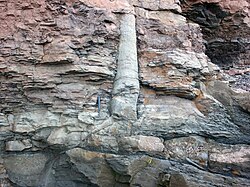Sigillaria
Sigillaria is a lycopod fossil of the late Carboniferous and early Permian.[1] They were typical coal forest trees similar to the Lepidodendron. These swamp forest trees grew to 50 meters. They were anchored by an extensive network of branching underground roots.[2]
It was a lycopod, an early land plant. This was one of the trees which made up the Carboniferous coal-forests.
It had thin grasslike leaves that grew on the stem. The stem of the plant was green. Sigillaria reproduced with spores. It went extinct about 300 million years ago.
Sigillaria Media
- Sigillaria.png
Artistieke impressie van de Sigillaria
- PSM V18 D631 Sigillaria reticulata and graeseri.jpg
Leaf scars are shown between the vertical sections of a Sigillaria where the leaves used to be attached
- Sigillariaceae - Sigillaria trigona.JPG
Fossil of Sigillaria trigona, on display at National Museum (Prague)
- Joggins-bark.jpg
Sigillaria lycopod fossil, Joggins, Nova Scotia, Canada
- Sigillaria1.jpg
Sigillaria on display at State Museum of Pennsylvania, from Sharon, Mercer County, Pennsylvania
- Sigillaria2.jpg
Sigillaria (bark) on display at State Museum of Pennsylvania, from Scranton, Lackawanna County, Pennsylvania
- Sigillaria sp.4 - Carbonifero.JPG
Replica of Sigillaria sp. at the University of A Coruña
In situ Lycopsid that is probably Sigillaria from the Pennsylvanian Joggins Formation in Nova Scotia
A close-up of the leaf scars on a Sigillaria notata
